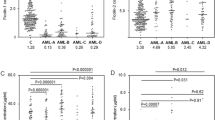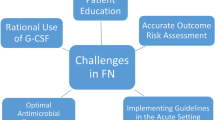Abstract
Despite significant changes in pediatric oncological therapy, mortality is still high, mainly due to infections. Complement system as an ancient immune defense against microorganisms plays a significant role in surmounting infections, therefore, deficiency of its components may have particular importance in malignancies. The present paper assesses the effect of promoter (X/Y) and exon 1 (A/0) polymorphisms of the MBL2 gene altering mannose binding lectin (MBL) serum level in pediatric oncological patients with febrile neutropenia. Furthermore, frequency distribution of MBL2 alleles in children with malignancies and age-matched controls was analysed. Fifty-four oncohematological patients and 53 children who had undergone pediatric surgery were enrolled into this retrospective study. No significant differences were found in the frequency of MBL2 alleles between the hemato-oncologic and control group. The average duration of fever episodes was significantly shorter (p = 0.035) in patients carrying genotypes (AY/AY and AY/AX) that encode normal MBL level, compared to individuals with genotypes associated with lower functional MBL level (AX/AX, AY/0, AX/0, or 0/0) (days, median (IQ range) 3.7(0–5.4) vs. 5.0(3.8–6.6), respectively). In conclusion, our data suggest that MBL2 genotypes may influence the course of febrile neutropenia in pediatric patients with malignancies, and may contribute to clarification of the importance of MBL in infections.
Similar content being viewed by others
References
Walport MJ (2001) Complement Second of two parts. N Engl J Med 344:1140–1144
Walport MJ (2001) Complement First of two parts. N Engl J Med 344:1058–1066
Neth O, Jack DL, Dodds AW, et al. (2000) Mannose-binding lectin binds to a range of clinically relevant microorganisms and promotes complement deposition. Infect Immun 68:688–693
Garred P (2008) Mannose-binding lectin genetics: from a to Z. Biochem Soc Trans 36:1461–1466
Garred P, Larsen F, Madsen HO, et al. (2003) Mannose-binding lectin deficiency–revisited. Mol Immunol 40:73–84
Bouwman, LH, Roep, BO & Roos, (2006) A Mannose-binding lectin: clinical implications for infection, transplantation, and autoimmunity. Hum Immunol. 67:247–256.
Ruskamp JM, Hoekstra MO, Rovers MM, et al. (2006) (2006) mannose-binding lectin and upper respiratory tract infections in children and adolescents: a review. Arch Otolaryngol Head Neck Surg 132:482–486
Koutsounaki E, Goulielmos GN, Koulentaki M, et al. (2008) Mannose-binding lectin MBL2 gene polymorphisms and outcome of hepatitis C virus-infected patients. J Clin Immunol 28:495–500
Garred P, S J,J, Quist L, et al (2003) Association of mannose-binding lectin polymorphisms with sepsis and fatal outcome, in patients with systemic inflammatory response syndrome. J Infect Dis 188:1394–1403
Schmiegelow K, Garred P, Lausen B, et al. (2002) Increased frequency of mannose-binding lectin insufficiency among children with acute lymphoblastic leukemia. Blood 100:3757–3760
Neth O, Hann I, Turner MW, et al. (2001) Deficiency of mannose-binding lectin and burden of infection in children with malignancy: a prospective study. Lancet 358:614–618
Ghazi M, Isadyar M, Gachkar L, et al. (2012) Serum levels of mannose-binding lectin and the risk of infection in pediatric oncology patients with chemotherapy. J Pediatr Hematol Oncol 34:128–130
Horiuchi T, Gondo H, Miyagawa H, et al. (2005) Association of MBL gene polymorphisms with major bacterial infection in patients treated with high-dose chemotherapy and autologous PBSCT. Genes Immun 6:162–166
Peterslund NA, Koch C, Jensenius JC, et al. (2001) Association between deficiency of mannose-binding lectin and severe infections after chemotherapy. Lancet 358:637–638
Vekemans M, Robinson J, Georgala A, et al. (2007) Low mannose-binding lectin concentration is associated with severe infection in patients with hematological cancer who are undergoing chemotherapy. Clin Infect Dis 44:1593–1601
Frakking FN, Brouwer N, Dolman KM, et al. (2011) Mannose-binding lectin (MBL) as prognostic factor in paediatric oncology patients. Clin Exp Immunol 165:51–59
Bergmann OJ, Christiansen M, Laursen I, et al. (2003) Low levels of mannose-binding lectin do not affect occurrence of severe infections or duration of fever in acute myeloid leukaemia during remission induction therapy. Eur J Haematol 70:91–97
Lausen B, Schmiegelow K, Andreassen B, et al. (2006) Infections during induction therapy of childhood acute lymphoblastic leukemia–no association to mannose-binding lectin deficiency. Eur J Haematol 76:481–487
Martinez-Lopez J, Rivero A, Rapado I, et al. (2009) Influence of MBL-2 mutations in the infection risk of patients with follicular lymphoma treated with rituximab, fludarabine, and cyclophosphamide. Leuk Lymphoma 50:1283–1289
Rubnitz JE, Howard SC, Willis J, et al. (2008) Baseline mannose binding lectin levels may not predict infection among children with leukemia. Pediatr Blood Cancer 50:866–868
Zehnder, A, Fisch, U, Hirt, A, et al. (2009) prognosis in pediatric hematologic malignancies is associated with serum concentration of mannose-binding lectin-associated serine protease-2 (MASP-2). Pediatr Blood Cancer. 2009;53:53–57.
Frakking FN, Israels J, Kremer LC, et al. (2011) Mannose-binding lectin (MBL) and the risk for febrile neutropenia and infection in pediatric oncology patients with chemotherapy. Pediatr Blood Cancer 57:89–96
Bang P, Laursen I, Thornberg K, et al. (2008) (2008) the pharmacokinetic profile of plasma-derived mannan-binding lectin in healthy adult volunteers and patients with Staphylococcus aureus septicaemia. Scand J Infect Dis 40:44–48
Frakking FN, Brouwer N, van de Wetering MD, et al. (2009) Safety and pharmacokinetics of plasma-derived mannose-binding lectin (MBL) substitution in children with chemotherapy-induced neutropaenia. Eur J Cancer 45:505–512
Valdimarsson H (2003) Infusion of plasma-derived mannan-binding lectin (MBL) into MBL-deficient humans. Biochem Soc Trans 31:768–769
Acknowledgments
This work was supported by Együtt a Leukémiás Gyermekekért Alapítvány (Together for Children with Leukemia Foundation) and Gyermekonkológia Fejlesztéséért Alapítvány (Foundation for Development of Pediatric Oncology).
Conflict of Interest
The author(s) declare that they have no conflict interests.
Author information
Authors and Affiliations
Corresponding author
Rights and permissions
About this article
Cite this article
Fekete, F., Fadgyas, B., Papp, É. et al. The role of mannose binding lectin on fever episodes in pediatric oncology patients. Pathol. Oncol. Res. 22, 139–143 (2016). https://doi.org/10.1007/s12253-015-9992-x
Received:
Accepted:
Published:
Issue Date:
DOI: https://doi.org/10.1007/s12253-015-9992-x




